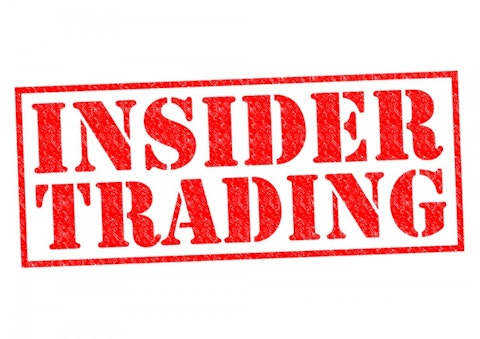Most stock market participants diagnose insider buying as a sign of management’s confidence in a company’s future prospects, and is being perceived as a bullish sign. On the other hand, insider selling is taken as a bearish indicator. However, this simplistic line of thought may not be entirely accurate at this point in time. It is widely known that insiders may sell shares for a variety of reasons that have nothing to do with their companies’ prospects or other firm-specific developments. Even so, this type of activity can offer great insights on how insiders feel about their companies’ stock performance. For instance, an insider may decide to unload shares because he/she does not expect any developments at his/her company that can potentialy lead to stock price appreciation. Having this in mind, let’s proceed with the discussion of the insider selling activity registered at three companies pinpointed by Insider Monkey.

chrisdorney/Shutterstock.com
Prior to discussing the insider trading activity, let’s make you familiar with what Insider Monkey does besides providing high-quality articles. At Insider Monkey, we track hedge funds’ moves in order to identify actionable patterns and profit from them. Our research has shown that hedge funds’ large-cap stock picks historically underperformed the S&P 500 Total Return Index by an average of seven basis points per month between 1999 and 2012. On the other hand, the 15 most popular small-cap stocks among hedge funds outperformed the S&P 500 Index by an average of 95 basis points per month (read more details here). Since the official launch of our small-cap strategy in August 2012, it has performed just as predicted, returning 102% and beating the market by more than 53 percentage points. We believe the data is clear: investors will be better off by focusing on small-cap stocks utilizing hedge fund expertise (while avoiding their high fees at the same time) rather than large-cap stocks.
To start with, Greenbrier Companies Inc. (NYSE:GBX) has seen two of its top executives offload their holdings this week. President and Chief Executive Officer William A. Furman reported selling 282,706 shares on Friday and 60,902 shares on Monday at prices ranging from $35.18-to-$37.45 per share, cutting down his overall holdings to roughly 1.35 million shares. William G. Glenn, Senior Vice President-Strategic Planning and Chief Commercial Officer since June 2009, sold 19,000 shares on Monday at a weighted average price of $36.10 and currently holds a mere 301 shares. The supplier of transportation equipment and services to the railroad industry has seen its shares drop 34% since the beginning of the year. It might be the case that these executives are unloading their holdings for personal reasons unrelated to the company’s prospects, but the timing of their sales does not represent a motive for optimism. Greenbrier Companies Inc. (NYSE:GBX) has a trailing P/E ratio of only 5.95, which is significantly lower than the 23.41 P/E of the S&P 500. The company also lost some of its appeal among the hedge funds monitored by our team during the second quarter, as the number of top money managers invested in the stock dropped to 22 from 27 quarter-on-quarter. Shashin Shah’s Think Investments acquired 300,000 put options on Greenbrier Companies Inc. (NYSE:GBX) during the June quarter.
Follow Greenbrier Companies Inc (NYSE:GBX)
Follow Greenbrier Companies Inc (NYSE:GBX)
Receive real-time insider trading and news alerts
The next page of the article discloses the insider sales registered at Oceaneering International (NYSE:OII) and Royal Caribbean Cruises Ltd (NYSE:RCL).





